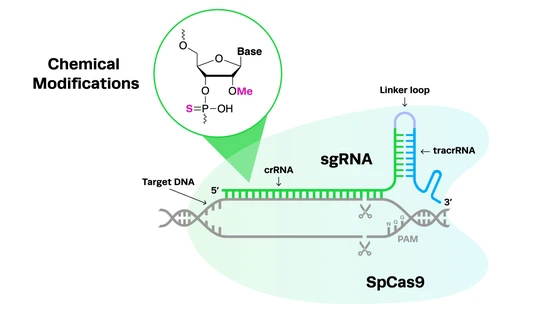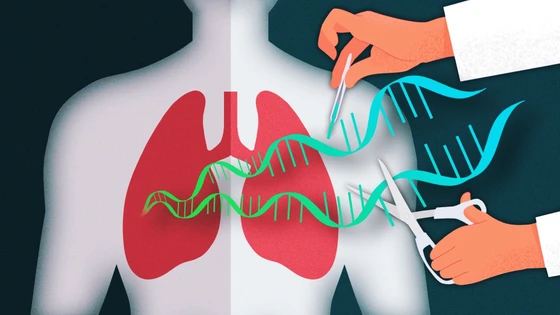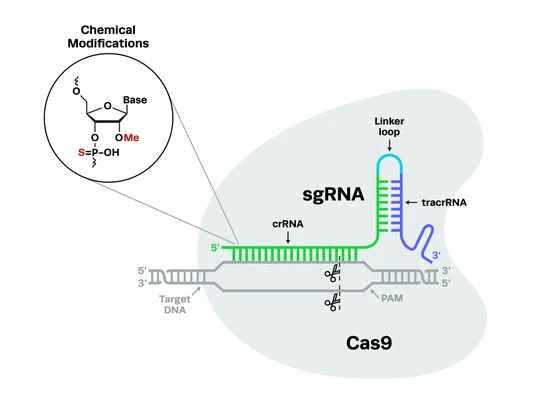The advent of CRISPR technology has revolutionized the field of gene editing, offering unprecedented possibilities for therapeutic development. A critical driver behind this innovation is the development of novel nucleases, which expand the potential for CRISPR-based treatments. From an intellectual property (IP) standpoint, these advanced nucleases bring several compelling benefits. This article explores how improved licensing structures, the strategic protection of research through commercial sub-licenses, and expanded access to gene targets can significantly impact biotech investors, research institutions, and scientists. Synthego’s nucleases and best-in-class gRNA are just one way we support our customers with innovative solutions that further scientific and therapeutic advancement.
Improved Licensing Models Enhance Economic Viability
One of the most significant benefits novel nucleases offer is the potential for improved licensing models. Traditional therapies often faced economic barriers due to restrictive and costly licensing agreements. However, the emergence of novel nucleases enables more flexible and favorable licensing terms, which can dramatically improve the economics of therapeutic development. Synthego’s streamlined approach enables customers to identify and optimize their CRISPR-based editing strategy through gene target and nuclease selection before committing to a commercial license. With more nucleases coming to market, we see competition driving the need to simplify financial terms for licensing, helping reduce back-and-forth negotiations.
Past Therapies Become Economically ViablePast therapies that were previously deemed economically unfeasible can now be revisited. The enhanced licensing structures associated with novel nucleases provide better financial pathways, making it possible to pursue therapies that may have been shelved due to prohibitive costs and poor ROI potential. This shift opens the door for a broader range of therapeutic innovations, extending the reach and impact of CRISPR technology.
Past therapies that were previously deemed economically unfeasible can now be revisited. The enhanced licensing structures associated with novel nucleases provide better financial pathways, making it possible to pursue therapies that may have been shelved due to prohibitive costs and poor ROI potential. This shift opens the door for a broader range of therapeutic innovations, extending the reach and impact of CRISPR technology.
Protecting Research with Commercial Sub-Licenses
Securing IP through commercial sub-licenses is another critical benefit of novel nucleases. This approach offers robust protection for research that can include specific gene targets, ensuring that intellectual property remains safeguarded while advancing through the therapeutic continuum. This model encourages innovation and protects the ongoing development of breakthrough therapies.
Assurance of Research ContinuityFor research institutions and scientists, protecting their discoveries through sub-licenses ensures continuity and security in their research endeavors. This protection is particularly crucial when pursuing long-term projects that require substantial investment and development time. Establishing this protection early helps prevent future economic variability in the market value of high performing nucleases and gives your organization a more predictable financial path to success as you develop your therapies.
For research institutions and scientists, protecting their discoveries through sub-licenses ensures continuity and security in their research endeavors. This protection is particularly crucial when pursuing long-term projects that require substantial investment and development time. Establishing this protection early helps prevent future economic variability in the market value of high performing nucleases and gives your organization a more predictable financial path to success as you develop your therapies.
Alternatives to CRISPR-Cas9: Nucleases for Next-Gen Therapy
There are now many alternatives to CRISPR-Cas9. In this blog, we explore CRISPR alternative nucleases and how they are being used to create new therapies.

Access to Previously Restricted Gene Targets
New IP protections for advanced nucleases grant researchers and developers access to gene targets that were previously out of reach. Each nuclease has a unique PAM sequence recognition profile that enables it to cut at specific sites in the genome, allowing for a fresh evaluation of approaches that may not have been successful with earlier nucleases. This exclusivity is a game-changer for multiple reasons.
Unlocked Potential for Novel TherapiesHaving access to new gene targets means that researchers can explore and develop novel therapies that address unmet medical needs. This access not only fosters innovation but also strengthens the competitive positioning of organizations by enabling them to offer unique, patent-protected treatments.
Having access to new gene targets means that researchers can explore and develop novel therapies that address unmet medical needs. This access not only fosters innovation but also strengthens the competitive positioning of organizations by enabling them to offer unique, patent-protected treatments.
Strategic Competitive AdvantageFrom a business development perspective, holding exclusive IP rights to research provides a strategic competitive advantage. It allows companies to differentiate themselves in a crowded market and secure a stronger foothold in the rapidly evolving landscape of cell and gene therapy.
From a business development perspective, holding exclusive IP rights to research provides a strategic competitive advantage. It allows companies to differentiate themselves in a crowded market and secure a stronger foothold in the rapidly evolving landscape of cell and gene therapy.
Synthego Solutions
Synthego prioritizes CRISPR strategies that facilitate easier and more efficient commercial licensing processes. By emphasizing streamlined licensing procedures within our innovative CRISPR solutions, we aim to simplify the complexities associated with commercializing gene editing technologies. The integration of novel nucleases into CRISPR therapies offers a myriad of benefits from an IP standpoint. Improved licensing structures make previously unviable therapies economically feasible, while new IP protections provide exclusive access to critical gene targets. Additionally, securing research through commercial sub-licenses ensures robust protection and fosters collaborative innovation.
For scientists, biotech investors, and research institutions, understanding and leveraging these IP benefits is essential for maximizing the potential of CRISPR technology. By navigating the evolving landscape of gene editing with strategic IP management, stakeholders can unlock new opportunities, drive innovation, and achieve significant advancements in therapeutic development.
Ready to elevate your research and development efforts? Explore the power of novel CRISPR nucleases and secure your competitive edge in the world of CRISPR therapies today.







